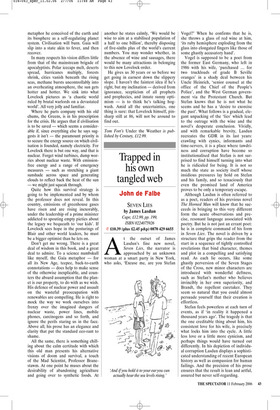Trapped in his own tangled web
John de Falbe
SEVEN LIES by James Lasdun Cape, £12.99, pp. 199, ISBN 0224075926 ✆ £10.39 (plus £2.45 p&p) 0870 429 6655 At the outset of James Lasdun’s fine new novel, Seven Lies, the narrator is approached by an unknown woman at a smart party in New York, who asks, ‘Excuse me, are you Stefan Vogel?’ When he confirms that he is, she throws a glass of red wine at him, ‘its ruby hemisphere exploding from the glass into elongated fingers like those of some ghastly accusatory hand’.
Vogel is supposed to be a poet from the former East Germany, who left in 1986 with his wife, ‘purchased ... for two truckloads of grade B Seville oranges’ in a shady deal between his Uncle Heinrich, ‘senior counsel at the office of the Chief of the People’s Police’, and the West German government via the Protestant Church. But Stefan knows that he is not what he seems and he has a ‘desire to exorcise the past’. What follows is a gradual, elegant unpacking of the ‘lies’ which lead to the outrage with the wine and the novel’s desperate conclusion. Vividly, and with remarkable brevity, Lasdun recreates the GDR in its last years: crawling with cynics, informants and time-servers, it is a place where tawdriness and corruption have become so institutionalised that Stefan is not surprised to find himself turning into what he is ridiculed for being. It is not so much the state as society itself whose insidious pressures lay hold on Stefan and his family, and so tenaciously that even the promised land of America proves to be only a temporary escape.
Although Lasdun is often referred to as a poet, readers of his previous novel The Horned Man will know that he succeeds in bringing to this very different form the acute observations and precise, resonant language associated with poetry. But he is not just an errant poet: he is in complete command of his form in Seven Lies. The novel is driven by a structure that grips the reader from the start in a sequence of tightly controlled revelations that bind character, themes and plot in a compelling and satisfying read. As each lie occurs, like some ghastly perversion of the Seven Stages of the Cross, new minor characters are introduced with wonderful deftness, such as Stefan’s mother who believes invincibly in her own superiority, and Brandt, the repellent caretaker. They seem so natural that you could almost persuade yourself that their creation is effortless.
Stefan feels powerless at each turn of events, as if ‘in reality it happened a thousand years ago’. The tragedy is that the one creditable thing about him, his consistent love for his wife, is precisely what locks him into the cycle. A little less love or a little more cynicism, and perhaps things would have turned out differently. In his depiction of individual corruption Lasdun displays a sophisticated understanding of recent European history as well as compassion for human failings. And the precision of his prose ensures that the result is lean and artful, assured but never self-regarding.














































 Previous page
Previous page